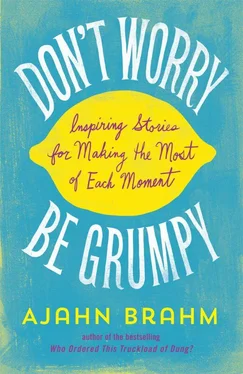So how much are you worth? Same as me, you are “priceless.”
A week after my return, I received another invitation to give a keynote address, this time at the annual convention of the British National Health Service in Birmingham, UK. Again, the organizers would pay all the costs. I declined, arguing that it is very unhealthy to make such long trips too frequently and so, as they were the British National Health Service, it would be hypocritical of me to attend.
In the past few years, the price of gold has increased enormously. Because “silence is golden,” then silence must be even more valuable today than ever. As a commodity becomes rarer, its value increases.
It is rare to find places of silence in today’s world. When I was a youth in London, I would often go into one of the many churches or cathedrals in the city, not to pray that it stopped raining or anything like that, but just to find a sanctuary of silence in which to calm my overactive brain and restore some peace of mind.
The last time that I sought such solace was after a busy day in the city when I entered the vast Westminster Abbey just to meditate quietly for half an hour. As soon as I entered, I was so disappointed. A week or two beforehand, a public address system had been installed with recorded sermons and announcements broadcast continuously. There was no silence any more. I considered this sacrilege and left.
As a result of that experience in Westminster Abbey, I have valued silence so highly that I have tried to create havens of silence in the monasteries and temples that I have influence over, and I have preserved those quiet refuges assiduously.
The building inspector of our local government made an appointment to see me. I thought that there might be some problem with our monastery structures, but he soon dispelled all such concerns. He had just come to thank me.
He told me that he had been working for many years for our local council as the official who gave the final approval on all the new building projects as well as renovations. It was a very stressful job, as builders wanted to cut corners and he had to insist on safety and quality. Whenever he felt stretched past the limit, he would get in his car, drive to our monastery, and park his car in the parking lot. He wouldn’t need to get out of his vehicle; just sitting there soaking in the silence was sufficient to relieve all his tiredness and tension.
He had spent many hours unwinding in our monastery parking area. It had been his secret refuge from the stress of his job. He then told me that he was about to retire. Before he left, he had to come and express his gratitude for the silence of our parking lot.
Monasteries where the monks meditate quietly, as opposed to those where they bang drums and ring monstrous bells many times each day, develop a palpable aura of peace. After many years, let alone centuries, that silence becomes as solid as the temple bricks that soak it in day after day, as comforting as a warm mug of soup on a cold night, and as soft and reassuring as a loving hug. Sermons and wise words aren’t necessary. Silence is the teacher and the healer.
A friend told me of the time he visited a quiet temple in Bangkok. As he entered the precinct, he noticed a woman sitting alone on a bench, sobbing. Not knowing Thai culture, he felt too uncomfortable to offer any assistance. Instead he went into one of the buildings to complete his own errand.
Half an hour later, when he came out, he saw that woman still sitting on the bench, but now no longer crying. So he went up to her to ask if she needed any help.
The woman spoke good English. She explained that she had just experienced a tragic event and was so distressed that she came to the monastery to calm herself down. She didn’t need counseling from any of the monks, nor did she need any help from the stranger. Having found this quiet bench and having had the freedom to cry for as long as she needed, without anyone interrupting her, she now felt so much better. Then she smiled and got up to leave.
“What was the tragedy, if I may ask?” inquired my friend.
“Oh,” she replied, “I lost my car keys.”
The famous founder of Taoism, Lao-tzu, would go on a walk every evening accompanied by one of his students. Lao-tzu held a strict rule that the student must not speak during the walk.
On one occasion, a new student was granted the honor of accompanying Lao-tzu on his walk. That day, the master and his disciple reached a ridge in the mountains just as the sun dropped below the horizon. The western sky was streaked with deep crimson, gold, and yellow, like fluttering banners for some celestial celebration.
The young student, in awe at the natural spectacle, burst out excitedly, “Wow! What a beautiful sunset!”
He had broken the strict rule of silence.
The master quietly turned around and walked back to the monastery. Once he had returned, Lao-tzu decreed that the young student could never again accompany him on a walk. He had broken the rule.
The young man’s friends tried to intercede for him. After all, it was only one sentence. What was wrong with commenting on such a glorious sunset anyway?
Lao-tzu explained: “When my student spoke, he was not seeing the sunset any more. He was only noticing the words.”
There is a fundamental difference between perceiving a description of something and experiencing the thing itself. It is just like the difference between a signpost and the place it is pointing to. Thinking is not the same as knowing.
So how do we achieve inner silence? Most people are so addicted to thought that they claim that they cannot stop thinking. The following exercise shows how easy it is to establish silence within, and how delightful it feels:
1. Sit comfortably, close your eyes, and relax your body for a minute or two.
2. Instead of indulging in thought, voicelessly recite to yourself the phrase “Namo tassa” over and over again for a minute.
3. Next, start to put pauses between the syllables: Na… Mo… Tas… Sa… Na… Mo… Tas… Sa… and so on.
4. Gradually increase the length of the pauses: Na….. Mo….. Tas….. Sa…
5. If thoughts come in between the pauses, shorten the spaces: Na Mo Tas Sa. This will crowd out the thoughts. Then try lengthening the pauses again.
6. Soon the spaces between the syllables will become long, and in those spaces, you will experience for yourself the indescribable inner silence.
It doesn’t matter what namo tassa means. It is better that you don’t know. Otherwise, it will start you off thinking again.
In my first year as a monk in northeast Thailand, the local village held a three-day-long party. Electricity had yet to reach the village, but petrol-driven generators, amplifiers, and huge loudspeakers certainly had. Although the village was over a kilometer away, the sound of the party was disturbing the precious serenity of our monastery.
Buddhism has always taught a “live and let live” philosophy, but when the party was still at full volume at 2:00 in the morning, we resolved to ask for a “sleep and let sleep” compromise. After all, we monks had to rise at 3:00 to start our monastic day.
We asked the headman if they could stop at 1:00, thereby giving us two hours of sleep at night. The answer was a polite no. So we sent a delegation to see our highly revered teacher, Ajahn Chah, and requested that he tell the villagers to turn down the volume at 1:00. We knew that the headman would follow whatever Ajahn Chah said.
It was on this occasion that Ajahn Chah taught us that “It is not the sound that disturbs you. It is you who disturb the sound!”
Читать дальше










